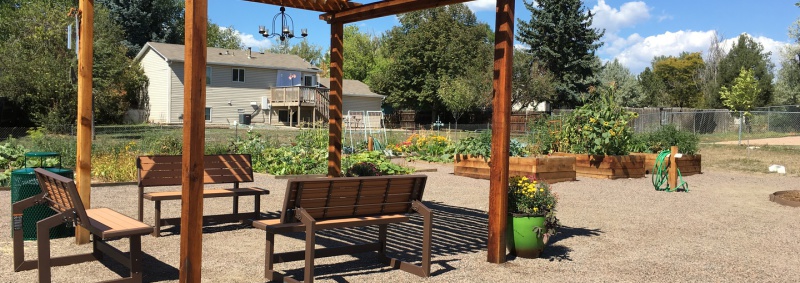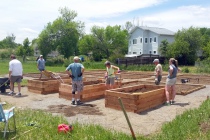
Garden Policies & Procedures
Common Earth Community Garden is established to grow and distribute vegetables, provide a source of wholesome food to local food banks, provide nutritional and cultural education for youth, a place of fellowship for multigenerational families, and outreach to our diverse neighbors on this shared common earth.
Plots will be rented to gardeners at the following prices for the 2024 season: Large beds $50, Raised beds $25. This fee covers the cost of water usage, common tools, topsoil, and compost.
Garden Access
|
Growing Season |
Water will be turned from May 1- October 1 (approximate dates) |
|
Hours |
Sunrise to sunset |
|
Parking |
Parking is available in the First United Church of Arvada parking lot |
|
Contact methods |
Email: commonearthcommgarden@gmail.com Website: commonearthcommunitygarden.org Like us on Facebook |
|
Restrooms |
Restrooms are not available at Common Earth Community Garden. |
Community Garden Plots
|
Supplies |
Gardeners are solely responsible for the planting and management of their own plots, including providing their own seeds, plants, and amendments. Compost will be supplied for all gardeners at the beginning of the planting season. |
|
Organic Gardening |
Common Earth Community Garden is an organic garden. Use of compost, organic mulch, and weeding are acceptable. The use of pesticides, herbicides, and rodenticides are not acceptable. Organic fertilizers are allowed. |
|
Water and Hoses |
Each gardener is responsible for watering his or her own plot - see suggestions for best practices.
Please do not leave a hose unattended |
|
Tools
|
You may store your tools in the shed, knowing that others may borrow them. If this will trouble you, please take your tools with you when you are done tending your plot. There are no trash cans in the garden this year. Please pack out your trash. |
|
Plot Boundaries |
Common Earth Community Garden plots are edged
with cedar edging. Interior boundary fences around individual plots are discouraged: they are difficult to weed and can quickly make the overall garden unsightly. |
|
Plot Maintenance |
Each plot must be kept clear of weeds, spent plants, debris, and
trash.
People not wanting their plots for any reason should notify the Common Earth Community Garden. Abandoned or neglected plots will be plowed under for weed control. |
|
Compost |
Individual compost bins are discouraged as they distract from the visual continuity of the community garden.
Common Earth Community Garden provides compost bins. All gardeners are encouraged to utilize the composting bins located on the north side of the garden. All materials used in our compost bins must be chopped into one- to two-inch pieces before being added. Please do not add diseased plant material to the compost bins.
Plastic bags of spent plants, grass clippings, and leaves are not allowed to be stored anywhere in the garden at any time. To a passerby, they appear to be bags of trash. Unopened bags of topsoil, compost, or manure are not to be stored in the garden. Chop and spread these materials in your plot immediately. |
|
Absence/Vacation |
Gardeners may not abandon their plots. Abandonment means failing to maintain a plot for 2 weeks. If a Gardener expects to be away from the garden and wishes to have a substitute gardener care for their plot please contact Common Earth Community Garden and a “Garden Angel” can be assigned to care for your garden for up to 2 weeks. |
|
Vertical Structures |
Structures to encourage vertical growth, including arbors, trellis, tree branch frames, fence sections, and cages are only allowed during the growing season if they are functional, orderly, safe, and attractive. All growing structures must be disassembled and removed during the off-season.
DUG does not permit the construction or existence of permanent shelter structures within the individual or shared community garden plots, including personal sheds, storage, or shade units. Individually constructed shelter structures present safety concerns. |
|
Off-Season Storage |
The following items are not authorized to be left standing during the off-season and must be disassembled and removed from the site when not in use: Chairs & individual benches
wire cages, fencing
Shoes, clothes bags of compost/leaves Sticks, steel posts non-permanent garden art Buckets, plastic containers pipe, hoses |
Common Areas and Gardener Responsibilities
|
Tools and Shed |
Gardeners will be allowed access to tools and shed in the 2023 gardening season |
|
Common Areas |
Gardeners will keep clean and neat any common areas, such as pathways and storage shed. Gardeners will promptly report any concerns about the safety of the garden to Common Earth Community Garden. |
|
Volunteer Hours |
All gardeners are encouraged to participate in the 2023 workdays, from 9:00-Noon. The 2023 workdays are scheduled for May 27th, June 24th, and July 29th. |
Conduct
|
General Conduct |
Gardeners are expected to be civil, honest, and cooperative in dealing with the landowner, Common Earth Community Garden, garden neighbors, other gardeners, and guests of other gardeners. |
|
Guests |
Gardeners may bring guests, including children into the garden, provided that the guests comply with the Gardener Expectations. Children are welcome in the garden, but they must be with an adult at all times. |
|
Respect Others Property |
Gardeners may not enter other plots, or harvest another gardener’s produce, without the explicit permission of the other gardener. Gardeners may not enter the private properties next to the garden without the owners' permission. |
|
Music |
Gardeners may play music. Music may not be loud enough to be a nuisance to other gardeners or to the garden’s neighbors. |
|
Illegal Plants |
Gardeners may not grow any plants considered to be illegal under state or federal law- this includes Cannabis Sativa (marijuana). |
|
Pets |
Gardeners may not bring any pet or animal into the garden, including for burial. Service dogs will be allowed in the garden if staying with their owner. Dogs are allowed in the field, if on a leash. Dogs may also be tied to the chain-link fence near the church structure. Please clean up after your dog. |
|
No Firearms |
Gardeners may not carry, use, or store firearms in the garden. |
|
No Smoking or Vapor |
This garden is a non-smoking, tobacco-free, vapor-free, environment. This is for the comfort and health of other gardeners; and to guard against the tobacco mosaic virus which affects tomatoes, peppers, and eggplants. |
|
No Alcohol or Drug use |
Alcoholic beverages may not be brought into the garden. |
Dispute Resolution
|
Dispute Resolution |
Gardeners will communicate any disputes about the garden or with fellow gardeners to the Common Earth Community Garden leaders. Common Earth Community Garden will have the power to hear these disputes and will resolve them in the best interest of the garden. If a mediator is requested, Common Earth Community Garden will utilize a mediator to resolve the dispute. |


